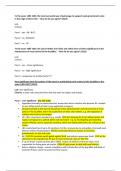'In the years 1485-1603, the most successful use of patronage to support royal government came
in the reign of Henry VIII.' - How far do you agree? (2023)
LoA:
Criteria:
Para 1 - yes - H8 - BUT…
Para 2 - no - Elizabeth
Para 3 - no - H7
'In the years 1485-1603, the Law in Wales Acts (1535 and 1542) were of minor significance in the
maintenance of royal control of the localities.' - How far do you agree? (2022)
LoA:
Criteria:
Para 1 - yes - minor significance
Para 2 - no - high significance
Para 3 - comparison to another factor???
How significant were the justices of the peace in maintaining royal control of the localities in the
years 1485-1603? (2021)
LoA: very significant
Criteria: as their roles stretched from law and order to religion and society
Para 1 - very significant - law and order
Appointed annually to county benches, monarchs tried to monitor who became JPs, needed
to own £20pa worth of land, some appointed as lawyers
already essential at the start of this period in the administration and enforcement of royal
justice in the localities and in the supervision of other vital matters, e.g. the regulation of
markets and of prices and wages
H7: often royal court members (e.g. Lovell), 1496 Act allowing JPs to act without juries and
replace corrupt jurors, judicial admin role increased - e.g. by investigating and reporting
suspect officials, and to supervise retaining, which was widely believed to be a threat to the
crown
H8: county benches of up to 35 members, for life, removal due to corruption, Cromwell used
them to enforce Protestantism, Wolsey summoned them to answer a 21-section
questionnaire on law and order
Ed: 1549 JPs inventory parish goods against theft and enforce new prayer book, 1552 act for
alehouses to be regulated by JPs due to socio-economic crisis of '40s-'50s
E: up to 90 per county (up from 20 in 1485), statute of Artificers enforced 1563, 1572
responsible for listing poor per parish, 1580s JPs get power to deal with new felonies.
Role in religious change - ensure compliance with introduction of the Eng Bible and Book of
Common Prayer, report recusants to Privy Council
, BUT: quality and diligence could vary widely, introduction of LLs and their deputies as a response to
doubts about the effectiveness of some county benches
COUNTER: LLs strengthened them, increased in number throughout which reinforced their
importance, without them there would be nobody to enforce law and order
Para 2 - very significant - religion and society
Appointed annually to county benches, monarchs tried to monitor who became JPs, needed
to own £20pa worth of land, some appointed as lawyers
already essential at the start of this period in the administration and enforcement of royal
justice in the localities and in the supervision of other vital matters, e.g. the regulation of
markets and of prices and wages
H7: often royal court members (e.g. Lovell), 1496 Act allowing JPs to act without juries and
replace corrupt jurors, judicial admin role increased - e.g. by investigating and reporting
suspect officials, and to supervise retaining, which was widely believed to be a threat to the
crown
H8: county benches of up to 35 members, for life, removal due to corruption, Cromwell used
them to enforce Protestantism, Wolsey summoned them to answer a 21-section
questionnaire on law and order
Ed: 1549 JPs inventory parish goods against theft and enforce new prayer book, 1552 act for
alehouses to be regulated by JPs due to socio-economic crisis of '40s-'50s
E: up to 90 per county (up from 20 in 1485), statute of Artificers enforced 1563, 1572
responsible for listing poor per parish, 1580s JPs get power to deal with new felonies.
Role in religious change - ensure compliance with introduction of the Eng Bible and Book of
Common Prayer, report recusants to Privy Council
BUT: failed to stop/bring enough control to prevent the religious rebellions under H8 and E1
COUNTER: without them, there would be nobody to enforce religious rule and even more rebellions
would be allowed to happen
Para 3 - not very significant - other means had to be improved to compensate for lack of JP
authority AND/OR were more significant
The office of JP was time-consuming and unpaid and many sought the office as a means of
social and political advancement - therefore, their quality and diligence could vary widely,
especially as their numbers grew
The introduction of Lord Lieutenants and their deputies in Elizabeth’s reign was, in part, a
response to doubts about the effectiveness of some county benches
The reformed Councils of the North and of Wales were hugely significant in maintaining
royal control of vital localities previously troublesome to the crown
The monarchy continued to rely on the aristocracy and gentry, also increasingly the
yeomanry, in the localities to maintain their control – this was lubricated by the extensive
use of patronage
Royal progresses were used to bolster royal authority in the localities, especially by Henry
VIII and Elizabeth I.
COUNTER: North and Wales = made of JPs, up to 90 per county (up from 20 in 1485) shows
importance of JPs, could be removed due to corruption, LLs kept them in check and made sure they
were effective
How significant were royal progresses in maintaining good relations between the crown and the
country in the years 1485-1603? (2020)




